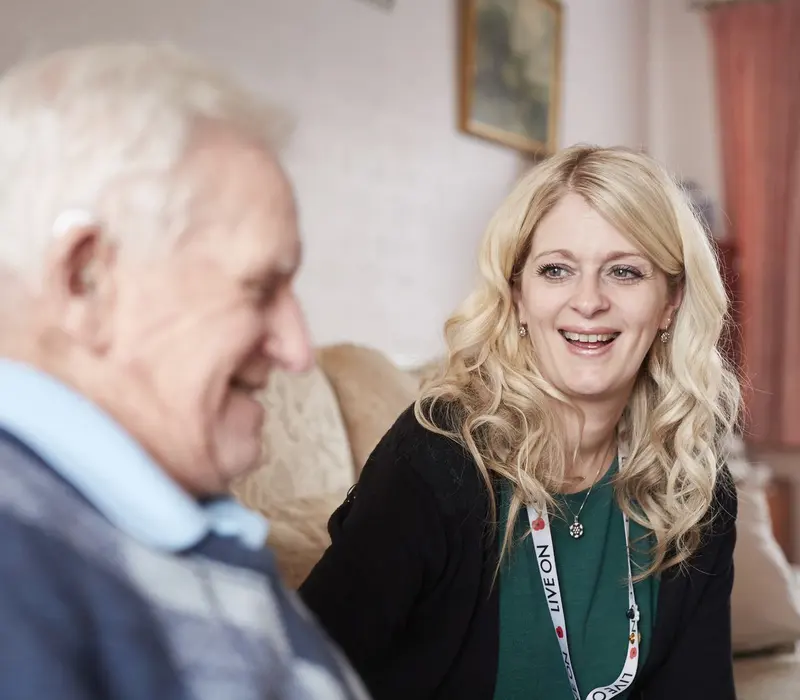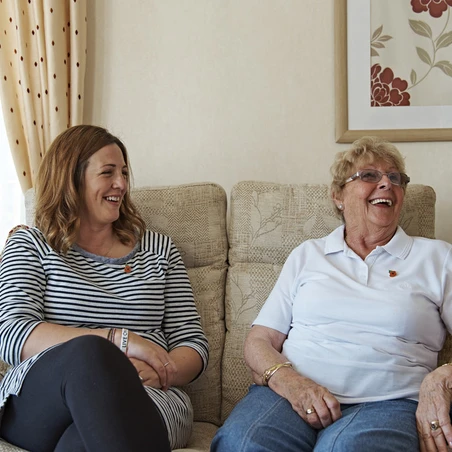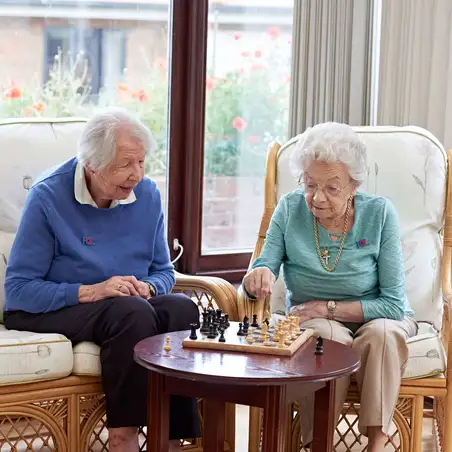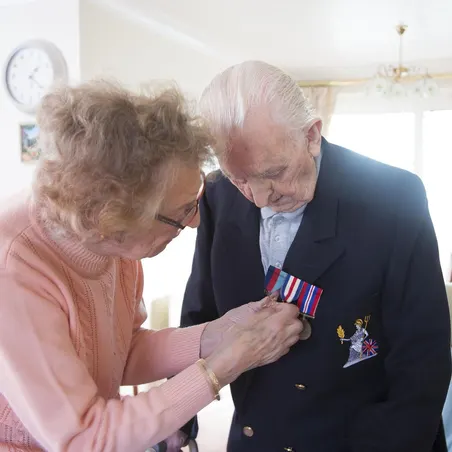On this page you will find information about:
- Advice and practical help for carers.
- Admiral Nurses.
- Support from your local authority.
We consider an adult or child to be a carer if they look after or give help to a family member, partner, friend, or neighbour who needs help because of their illness, frailty, disability, mental health problem, or addiction, and cannot cope without their support.
We're here to support you and those you’re caring for to get the help you need.
You are eligible for support whether you are:
- a veteran who has caring responsibilities
- a civilian who cares for a former or currently serving member of the Armed Forces community, or
- currently serving in the UK Armed Forces and have caring responsibilities.

Our aim is to improve quality of life for carers – and their loved ones.Nicky Addison, Lead Admiral Nurse
Financial support for carers and people who receive care
Whether you are cared for by someone, or you provide care to someone in your life, you might be eligible for financial support.
Read our helpful guide to find more information on benefits to assist carers and people who receive care, and learn how RBL can provide support when appealing a benefit decision.
Support from the Royal British Legion's Independent Living Advice Service
Independent Living is a specialist service within the Legion offering advice, support and advocacy to beneficiaries who want to remain independent and stay safe in their homes and communities. The service also supports carers, including helping them with getting a carer's needs assessment.
Emotional wellbeing support
Caring for someone can be overwhelming and draining on your emotional wellbeing. There are many organisations out there that not only support carers, but also have a specialised understanding of the Armed Forces community.
Admiral Nurses: Support for carers of people living with dementia
The Royal British Legion work in partnership with Dementia UK to provide Admiral Nurses – a specialist service helping the Armed Forces community and their families living with dementia. Admiral Nurses are not only there for those directly living with dementia, but they are also there to support carers.
Our Admiral Nurses are there to support you, and those you’re caring for, to get the help you need.
Admiral Nurses can provide:
- Emotional and psychological support for carers and families.
- Help to develop skills to encourage positive approaches to living with dementia.
- Information and practical advice for carers and families, including what financial benefits you might be able to claim.
Find other ways the Royal British Legion may be able to help on the RBL Knowledge Base.
The Ripple Pond: Support for family members of those physically or psychologically affected by their time in service
The Ripple Pond is a charity that supports adult family members of people who are physically or psychologically affected by their time in the Armed Forces. They believe in chosen family, and will support anyone over the age of 18 including partners, siblings, parents, friends and carers.
The Ripple Pond supports people through:
- specialist one to one sessions
- peer support groups, including 14 different regional chats
- talks and events
- employment Support, and
- signposting.
Complete their online application form to become a member and receive support from them.
Learn more about The Ripple Pond on their website, including how they can help.
To find out more about the support the RBL could offer you, contact us via
Telephone: 0808 802 8080
Telephone overseas: +44 (0)20 3376 8080
Calls are free
from UK landlines and main mobile networks
Email: [email protected]
Armed Forces Carer's Passport
Armed Forces Carer's Passports are a record of agreed arrangements between a person who is serving and their manager, to help assist them balance their work life and caring responsibilities. Their passport can cover topics such as flexible working options (adjusted hours and remote working) and flexible service (part-time work and limits on separation from their home base).
Eligibility
The Carer's Passport is here for service personnel who look after a family member, partner, or child who needs support with an illness, a special educational need or disability (SEND), or a mental health problem.
Service Personnel can have a Carer's Passport as soon as they start having caregiving responsibilities.
Learn more about Carer's Passports, including how to get one, on the GOV.UK website.
Advice and practical help for carers
Carers UK
Carers UK provides help and advice to carers, covering topics such as benefits, technology, employment and other help available.
- Visit the Carers UK to find out your rights as a carer and where you can go for financial or practical help.
- Download the Looking After Someone Guide from the Carers UK website.
- Search the Carers UK directory of local support for carers.
Get in touch
Get in touch with Carers UK by:
Telephone: 08088 087 777
Monday to Friday, 9am to 6pm.
NHS Carers Direct Helpline
If you wish to speak to someone in person, you can call the NHS Carers Direct Helpline. Calls are free and confidential.
If you are finding it difficult to care for someone with a mental health condition, there are many support groups to choose from for you to join. Call the NHS Carers Direct Helpline to find out more about joining a support group.
Get in touch
Contact he NHS Carers Direct Helpline by:
Telephone: 0300 123 1053
From 9am to 8pm, Mondays to Fridays.
Support from your local authority
Under the Care Act 2014, any carer who appears to need support should be offered an assessment by their local council. A carer’s assessment is for adult carers of adults (over 18 years) who are disabled, ill or elderly.
The assessment will look at how caring affects your life, including physical, mental and emotional needs, and whether you are able or willing to carry on caring.
Support may include:
- regular breaks from caring
- equipment and adaptations to make some caring tasks easier to manage
- help with housework, and
- advice about benefits for carers.
Contact your local authority to request an assessment through the GOV.UK website.
Support for carers of children with additional needs
Family members or children of someone who is or has served may face extra barriers when trying to access support for children and young people who have SEND. The guidance below has been written to help people in the currently serving and ex-service Armed Forces community find support for children and young people with SEND that they care for.





